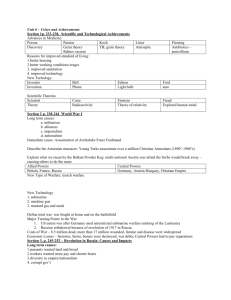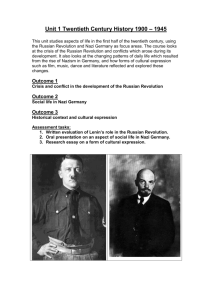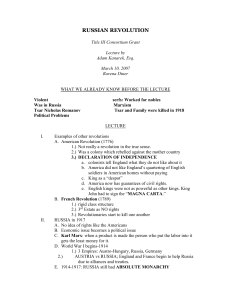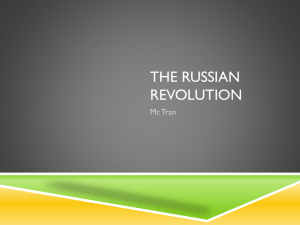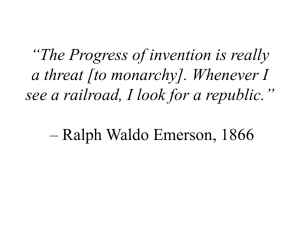AP Euro: Conservative Order & Reform Worksheet
advertisement
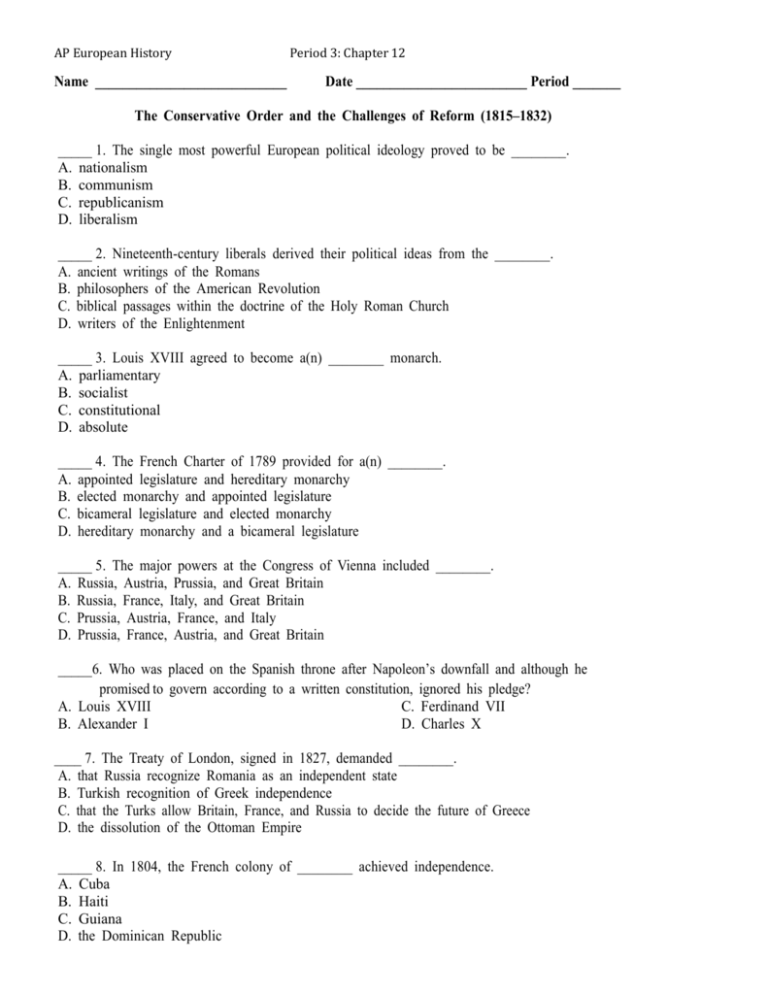
AP European History Name ____________________________ Period 3: Chapter 12 Date _________________________ Period _______ The Conservative Order and the Challenges of Reform (1815–1832) _____ 1. The single most powerful European political ideology proved to be ________. A. nationalism B. communism C. republicanism D. liberalism _____ 2. Nineteenth-century liberals derived their political ideas from the ________. A. ancient writings of the Romans B. philosophers of the American Revolution C. biblical passages within the doctrine of the Holy Roman Church D. writers of the Enlightenment _____ 3. Louis XVIII agreed to become a(n) ________ monarch. A. parliamentary B. socialist C. constitutional D. absolute _____ 4. The French Charter of 1789 provided for a(n) ________. A. appointed legislature and hereditary monarchy B. elected monarchy and appointed legislature C. bicameral legislature and elected monarchy D. hereditary monarchy and a bicameral legislature _____ 5. The major powers at the Congress of Vienna included ________. A. Russia, Austria, Prussia, and Great Britain B. Russia, France, Italy, and Great Britain C. Prussia, Austria, France, and Italy D. Prussia, France, Austria, and Great Britain _____6. Who was placed on the Spanish throne after Napoleon’s downfall and although he promised to govern according to a written constitution, ignored his pledge? A. Louis XVIII C. Ferdinand VII B. Alexander I D. Charles X ____ 7. The Treaty of London, signed in 1827, demanded ________. A. that Russia recognize Romania as an independent state B. Turkish recognition of Greek independence C. that the Turks allow Britain, France, and Russia to decide the future of Greece D. the dissolution of the Ottoman Empire _____ 8. In 1804, the French colony of ________ achieved independence. A. Cuba B. Haiti C. Guiana D. the Dominican Republic AP European History Period 3: Chapter 12 _____ 9. By 1830, ________ had achieved independence. A. Argentina B. most of Latin America C. Colombia D. Bolivia _____ 10. When Tsar Alexander I died in November 1825, who succeeded him? A. Constantine B. Paul C. Nicholas D. Alexander II _____ 11. The Russian tsar was king of ________ and frequently infringed on the constitution and quarreled with its diet. A. Serbia B. Prussia C. Finland D. Poland _____12. ________ lowered interest rates on government bonds to indemnify aristocrats who lands in the French Revolution. A. Louis XVIII C. Alexander I B. Charles X D. Louis Philippe had lost _____ 13. Britain saw a(an) _____ opportunity in the weakness of Spain after the Spanish Revolution. A. economic C. military B. religious D. cultural _____ 14. In 1821, the Ottoman’s faced a revolt of the ________. A. Turks C. Greeks B. Italians D. Serbians _____ 15. A peaceful rebellion against colonial powers occurred in ________. A. Haiti B. Argentina C. New Spain D. Brazil _____ 16. Primogeniture in France was restored by ________. A. liberals in government C. Charles X B. conservatives in government D. Louis XVIII _____ 17. What type of person joined the Burschenschaften? A. professionals B. students C. merchants D. government officials _____ 18. Early 19th century nationalism directly opposed the principle upheld at the AP European History A. B. C. D. Period 3: Chapter 12 Congress of Vienna that ________. ethnicity, rather than monarchies or dynasties, provide the basis for political unity legitimate monarchies or dynasties, rather than ethnicity, provide the basis for political unity military strength, rather than ethnicity, provides the basis for political unity common language should provide the basis for political unity _____ 19. A significant difficulty for nationalism was, and is, ________. A. transitioning from monarchies to republicanism and peaceful elections B. determining which ethnic groups could be considered nations C. deciding which religion should be accepted as the formal religion of the state D. settling on which national customs should be formally adopted by the state and schools _____ 20. Which of the following correctly identifies the major pillars of 19th century conservatism? A. solid military, established churches, and legitimate monarchies B. established churches, burgeoning merchant class, and legitimate monarchies C. landed aristocracies, established churches, and solid military D. legitimate monarchies, landed aristocracies, and established churches _____ 21. The Six Acts attempted to ________. A. curb political dissent B. give the monarchy new powers and begin military expansion C. raise public revenue through taxes and prohibit illegal search and seizures D. prevent Catholics from exercising their civil rights _____ 22. The Concert of Europe refers to the ________. A. new informal arrangement for resolving mutual foreign policy issues B. new Russian, Austrian, Prussian, and British quadruple alliance C. January 1820 outbreak of the Spanish revolution D. 1814 restoration of the French monarchy _____ 23. What did the Protocol of Troppau require of European governments? A. They agreed to intervene to restore order in countries threatened by revolution. B. They agreed to prop up monarchies that were in danger of being overthrown. C. They agreed to support liberal revolutionary movements in their own countries. D. They agreed to install liberal reforms, such as free press and religious tolerance. ______ 24. What event sparked movements for independence from European domination A. B. C. D. the the the the throughout Latin America? wars of the French Revolution, particularly those of Napoleon French and Indian War American Revolution from Great Britain Crimean War _____ 25. Tsar Alexander I turned away from reform and at home and abroad took the lead in suppressing ________. A. nationalism and communism B. liberalism and nationalism C. communism and socialism D. socialism and liberalism AP European History Period 3: Chapter 12 _____ 26. The Four Ordinances were an example of ________. A. conservative reaction B. liberal reform C. radical reform D. the work of the Concert of Europe _____ 27. What event led to the exile of Charles X in France? A. the July Revolution B. the Great Reform Bill C. the storming of the Bastille D. the Decembrist Revolution _____ 28. The slogan “Orthodoxy, Autocracy, and Nationalism” was associated with ____. A. the Russian Orthodox Church B. Official Nationality C. the Russian military D. the Congress of Vienna _____ 29. A. Serbia B. Serbia C. Russia D. Serbia What was the relationship between Russia and Serbia after the mid-1820s? was colonized by Russia. was overtaken by political forces in Russia. became the protector of Serbia. revolted against Russian control. _____ 30. What did Louis XVIII hope to achieve in his constitution called the Charter? A. He hoped to suppress the Roman Catholic Church. B. He hoped to improve trade. C. He hoped to bring about the policies of the Declaration of the Rights of Man and Citizen. D. He hoped to reconcile with the aristocracy and the church. _____ 31. Why did the Habsburg Empire resist nationalism? A. The Habsburg Empire was at war with the other nations of Europe. B. The Habsburg Empire and Austria ruled lands in Italy. C. Nationalism would seriously weaken the ethnically diverse Habsburg Empire. D. Nationalism would bring all the people of the Habsburg Empire together and perhaps rally against the emperor. _____32. Which of these best parallels the relationship between England and Ireland in the 1800s? A. Austria and Hungary C. Russia and Poland B. Prussia and Germany D. France and Belgium _____ 33. A major impediment to an alliance between liberals and workers was the liberal policy of ________. A. opposition to labor unions B. population control C. a free market D. supporting imperialism _____ 34. Which generalization is most accurate regarding the progress of reform in Prussia under AP European History Period 3: Chapter 12 Frederick William III? A. Reform movements progressed quickly with a supportive government. B. Government policies granted freedom to make liberal reforms. C. The reform movement was defeated completely under the conservative policies of Frederick William III. D. Violent revolutionaries took control of the government pushing their powerful agendas. _____35. Which of the following events illustrated to Russian soldiers how backward and politically stifled their own nation remained? A. Russian and Austrian commercial exchange B. Russian battles with the Prussians C. Russian occupation of France D. visits by foreign army officers Short Answer: 1. Compare and contrast the political reforms in Great Britain, Belgium, France, and Russia. What political strategies were successful? Which approaches failed? Was there one universal formula for success? Why or why not? Explain. Topic: The Conservative Order Shaken in Europe 2. How were European aristocrats affected by conservative governments? What traits or privileges did conservative aristocrats retain, gain, or lose? How did aristocrats see themselves during this era? Explain. Topic: The Conservative Order


